新概念英语第二册:第16课课文详解及语法解析
- 格式:doc
- 大小:13.26 KB
- 文档页数:3
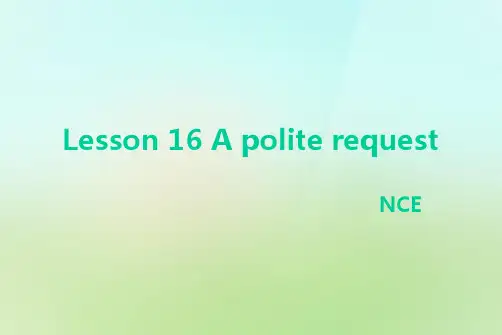
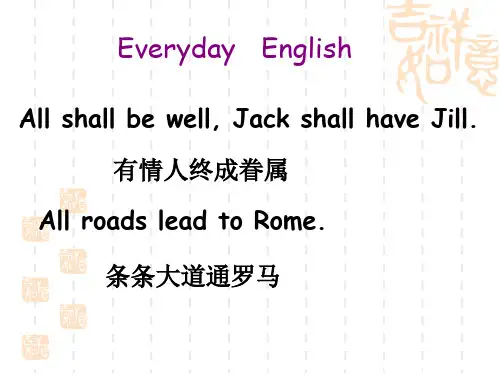
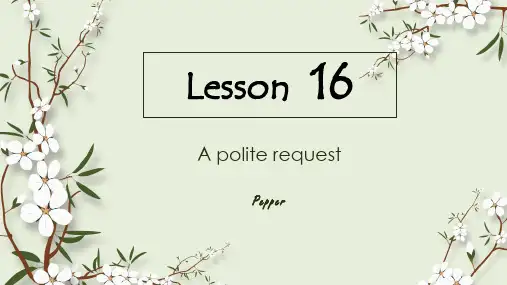
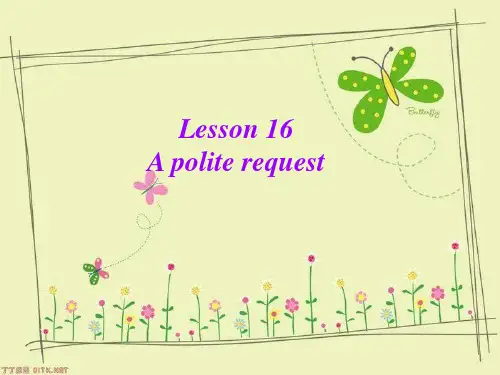
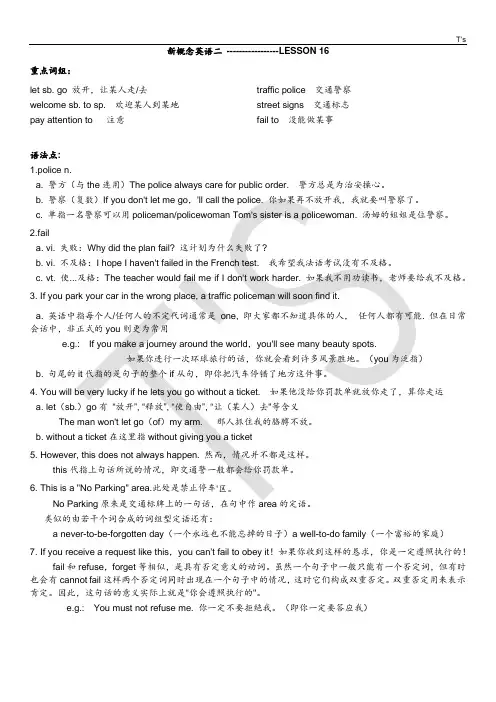
新概念英语二-----------------LESSON 16重点词组:let sb. go 放开,让某人走/去welcome sb. to sp. 欢迎某人到某地pay attention to 注意traffic police 交通警察street signs 交通标志fail to 没能做某事语法点:1.police n.a. 警方(与the连用)The police always care for public order. 警方总是为治安操心。
b. 警察(复数)If you don't let me go,'ll call the police. 你如果再不放开我,我就要叫警察了。
c. 单指一名警察可以用policeman/policewoman Tom's sister is a policewoman. 汤姆的姐姐是位警察。
2.faila. vi. 失败:Why did the plan fail? 这计划为什么失败了?b. vi. 不及格:I hope I haven't failed in the French test. 我希望我法语考试没有不及格。
c. vt. 使...及格:The teacher would fail me if I don't work harder. 如果我不用功读书,老师要给我不及格。
3. If you park your car in the wrong place, a traffic policeman will soon find it.a. 英语中指每个人/任何人的不定代词通常是one, 即大家都不知道具体的人,任何人都有可能. 但在日常会话中,非正式的you则更为常用e.g.: If you make a journey around the world,you'll see many beauty spots.如果你进行一次环球旅行的话,你就会看到许多风景胜地。
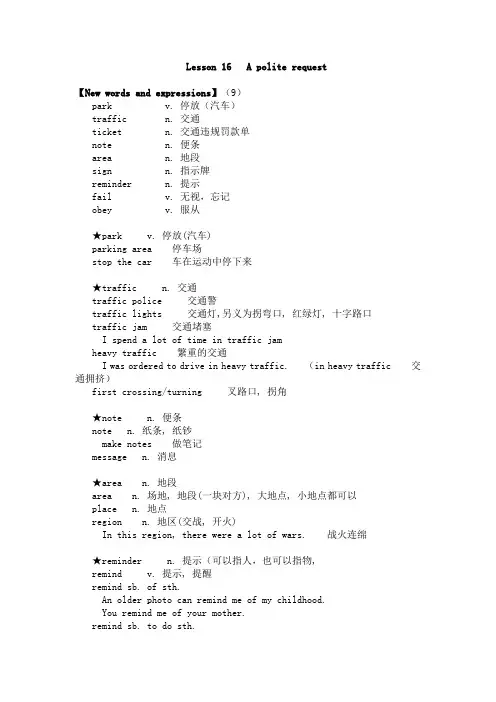
Lesson 16 A polite request【New words and expressions】(9)park v. 停放(汽车)traffic n. 交通ticket n. 交通违规罚款单note n. 便条area n. 地段sign n. 指示牌reminder n. 提示fail v. 无视,忘记obey v. 服从★park v. 停放(汽车)parking area 停车场stop the car 车在运动中停下来★traffic n. 交通traffic police 交通警traffic lights 交通灯,另义为拐弯口, 红绿灯, 十字路口traffic jam 交通堵塞I spend a lot of time in traffic jamheavy traffic 繁重的交通I was ordered to drive in heavy traffic. (in heavy traffic 交通拥挤)first crossing/turning 叉路口, 拐角★note n. 便条note n. 纸条, 纸钞make notes 做笔记message n. 消息★area n. 地段area n. 场地, 地段(一块对方), 大地点, 小地点都可以place n. 地点region n. 地区(交战, 开火)In this region, there were a lot of wars. 战火连绵★reminder n. 提示(可以指人,也可以指物,remind v. 提示, 提醒remind sb. of sth.An older photo can remind me of my childhood.You remind me of your mother.remind sb. to do sth.★fail v. 无视, 忘记,失败① vi. 失败fail+宾语做某事失败fail (in) doing sth. 在某些方面失败(in可省略)He failed.He failed (in) examination.② vi. 不及格I hope I haven’t failed in the French test.③ vt. 使……不及格The teacher said he would fail me if I don’t work harder.④ vt. 未能……,不能……,忘记……(后接不定式)fail to do sth. 没有能够做某事,忘记做……He failed to swim across the river.He failed to finish his work in time.Don’t fail to past the letter for me.not fail to do sth. 一定能够某事I can not fail to pass it.You can not fail to drive it. 你一定能够驾驶If you arrived in Beijing, you cannot fail to find the New Oriental School.【Text】If you park your car in the wrong place, a traffic policeman will soon find it. You will be very lucky if he lets you go without a ticket. However, this does not always happen. Traffic police are sometimes very polite. During a holiday in Sweden, I found this note on my car: 'sir, we welcome you to our city. This is a "No Parking" area. You will enjoy your stay here if you pay attention to our street signs. This note is only a reminder.' If you receive a request like this, you cannot fail to obey it!参考译文一旦你把汽车停错了地方, 交通警很快就会发现. 如果他没给你罚单就放你走了, 算你走运. 然而, 情况并不都是这样, 交通警有时也很客气. 有一次在瑞典度假, 我发现我的车上有这样一个字条 : “先生, 欢迎您光临我们的城市. 此处是‘禁止停车’区. 如果您对我们街上的标牌稍加注意, 您在此会过得很愉快的. 谨此提请注意. “如果你收到这样的恳求, 你是不会不遵照执行的!【课文讲解】1、If you park your car in the wrong place, a traffic policeman will soon find it.英语中指每个人/任何人的不定代词通常是one,但在日常会话中,非正式的you更为常用。
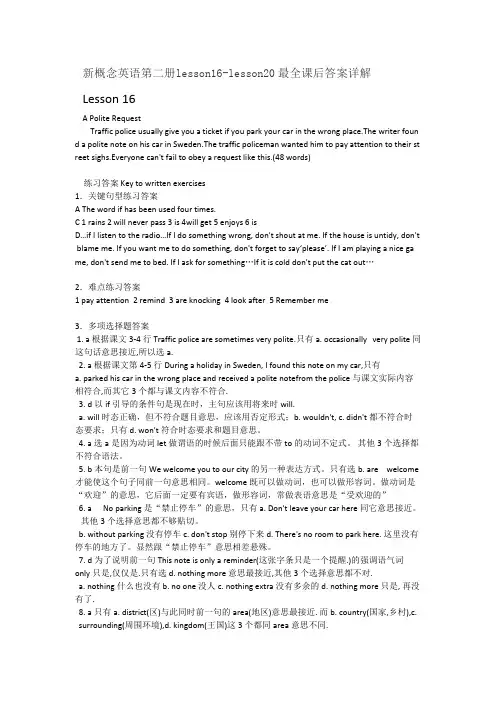
新概念英语第二册lesson16-lesson20最全课后答案详解Lesson 16A Polite RequestTraffic police usually give you a ticket if you park your car in the wrong place.The writer foun d a polite note on his car in Sweden.The traffic policeman wanted him to pay attention to their st reet sighs.Everyone can't fail to obey a request like this.(48 words)练习答案 Key to written exercises1.关键句型练习答案A The word if has been used four times.C 1 rains 2 will never pass 3 is 4will get 5 enjoys 6 isD…if I listen to the radio…If I do something wrong, don't shout at me. If the house is untidy, don't blame me. If you want me to do something, don't forget to say‘please’. If I am playing a nice ga me, don't send me to bed. If I ask for something…If it is cold don't put the cat out…2.难点练习答案1 pay attention2 remind3 are knocking4 look after5 Remember me3.多项选择题答案1. a根据课文3-4行 Traffic police are sometimes very polite.只有a. occasionally very polite 同这句话意思接近,所以选a.2. a根据课文第4-5行During a holiday in Sweden, I found this note on my car,只有a. parked his car in the wrong place and received a polite notefrom the police与课文实际内容相符合,而其它3个都与课文内容不符合.3. d以if引导的条件句是现在时,主句应该用将来时will.a. will 时态正确,但不符合题目意思,应该用否定形式;b. wouldn't,c. didn't 都不符合时态要求;只有d. won't 符合时态要求和题目意思。
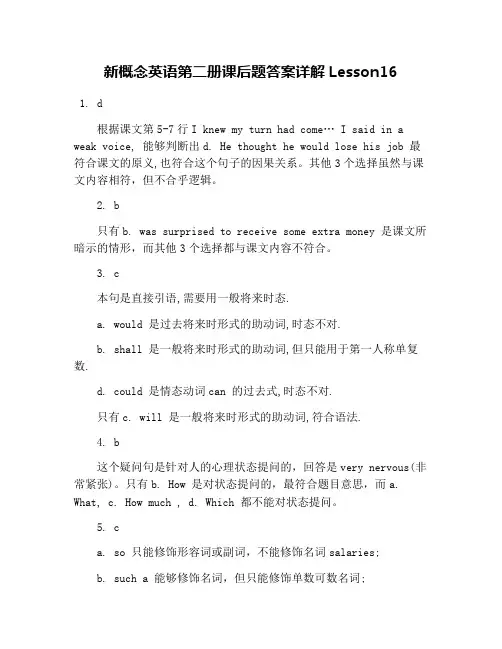
新概念英语第二册课后题答案详解Lesson161. d根据课文第5-7行I knew my turn had come… I said in a weak voice, 能够判断出d. He thought he would lose his job 最符合课文的原义,也符合这个句子的因果关系。
其他3个选择虽然与课文内容相符,但不合乎逻辑。
2. b只有b. was surprised to receive some extra money 是课文所暗示的情形,而其他3个选择都与课文内容不符合。
3. c本句是直接引语,需要用一般将来时态.a. would 是过去将来时形式的助动词,时态不对.b. shall 是一般将来时形式的助动词,但只能用于第一人称单复数.d. could 是情态动词can 的过去式,时态不对.只有c. will 是一般将来时形式的助动词,符合语法.4. b这个疑问句是针对人的心理状态提问的,回答是very nervous(非常紧张)。
只有b. How 是对状态提问的,最符合题目意思,而a. What, c. How much , d. Which 都不能对状态提问。
5. ca. so 只能修饰形容词或副词,不能修饰名词salaries;b. such a 能够修饰名词,但只能修饰单数可数名词;d. a such 不符合语法;只有c. such 能够修饰复数名词。
6. d这个疑问句是对所有格形容词提问的,所以需要一个能对所有格提问的疑问词。
a. which 能够对定语提问,但不能对所有格形容词提问;b. to whom 和c. whom 都只能对宾语提问; 只有d. whose 是对所有格形容词提问的,所以应该选d.7. a只有a. in 才能同后面的名词a weak voice 构成一个表示方式的短语,意思是“用微弱的嗓音说话”而其他3个选择都不能跟 a weak voice 构成符合习惯用法的短语。
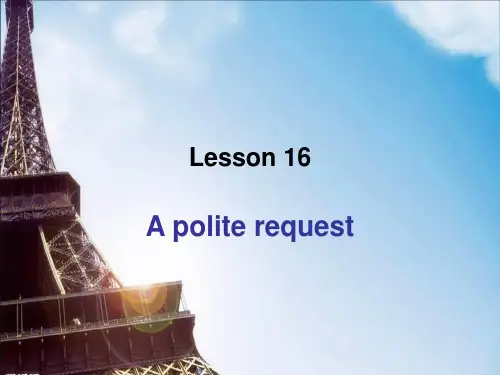
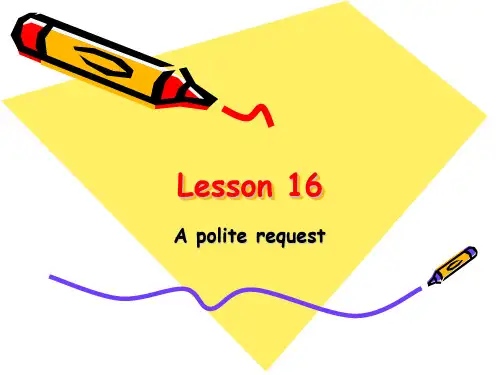
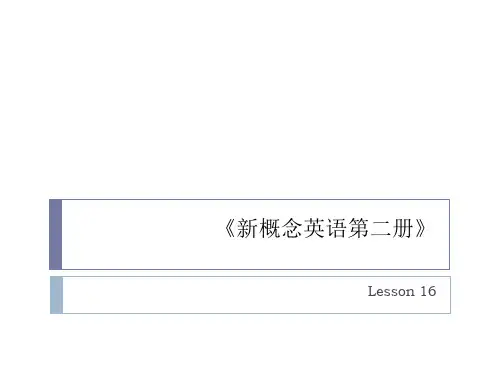
lesson 16★new words and expressions☆park v.停放(汽车)stop the car 车在运动中停下来parking area 停车场no parking :禁止停车(标志)☆traffic n.交通traffic police 交通警traffic lights 交通灯traffic lights=crossing/turning:十字路口(听力中常考)(in) traffic jam 交通堵塞(in) heave traffic 交通拥挤☆note n.便条;纸钞message 消息make notes 做笔记☆area n.地段;场地(一块地方)place 地点region 地区(交战、开火)☆reminder n.提示(可以致人、也可指物)v.指示;提醒reminder sb of sthreminder sb to do sth★fail v.无视;忘记v.失败fail+宾语失败做某事fail in doing sth 在某些方面失败fail to do 没有能够做某事he fail to swim across the river.not fail to do sth 一定能做某事i can not fail to pass it. 我一定会通过的。
you can not fail to obey it. 你一定会遵守。
★textif you park your car in the wrong place, a traffic policeman willsoon find it. you will be very lucky if he lets you go without aticket. however, this does not always happen. traffic police are sometimes very polite. during a holiday in sweden, i found thisnot on my car:…sir, we welcome you to our city. this is a “noparking” area. you will enjoy your stay here if you pay attentionto out street signs. this note is only a reminder.‟if you receive arequest like this you cannot fail to obey it!☆in the wrong placewrong 不合适的right 合适的he is the wrong / right person who you are looking for .☆however 然而,在写作中常用however 放在句首或句中都可以,经常用逗号隔开(转折性语气较弱)but 习惯放在两个句子之间(转折性语气较强)☆You will enjoy your stay here.(要求背过)Enjoy your stay here.=Have a good time.★key structures☆条件句真实条件句:假设很有可能发生真实条件句中从句往往为现在时,主句中会用一般将来时用使句eg : if he is sleeping, don‟t wake him up.☆if 引导的叫条件,without 后面引导的也叫条件without + n. 如果没有起了条件的作用without water, fish can‟t live.★special difficulties☆police 一定会作复数看待☆pay attention to ; care ; take care of ; look afterpay attention to 在思想上注意notice =see(眼睛看)care 关心;在意eg : i don’t care / who care. 我不在乎。
Lesson 16 A polite requestArticle I f you park your car in the wrong place, a traffic policeman will soon soon find it. find it. You will be very lucky if he lets you go without a ticket. However, However, this does not always happen. this does not always happen. Traffic police are sometimes very very polite. polite. polite. During a holiday in Sweden, I found this During a holiday in Sweden, I found this note on my car: ' Sir, Sir, we welcome you to our city. This is a "No we welcome you to our city. This is a "No Parking" area. You will enjoy your stay here if you pay attention to our street signs. T his This note is only a a a reminder.' If you receive reminder.' If you receive a a request like this, you cannot request like this, you cannot fail to obey it! Question When did the writer find a polite note on his car?The writer found a police note on his car during a holiday in Sweden.What did the traffic policeman want him to do?The traffic police wanted him to pay attention to their street signs. Can anyone fail to obey a request like this or not?No one can fail to obey a polite request. New words park v . v. 停放(汽车)traffic n . n. 交通ticket n. 交通违规罚款单note n. 便条area n. 地段sign n. 指示牌reminder n. 提示fail v. 无视,忘记obey v. 服从Grammar 真实条件句(Sentences of Real Condition)真实条件句是表示在某种条件或要求下,预期会产生某种结果的表达方法。
新概念英语第二册_第16课课件Lesson 16 A Polite Request彬彬有礼的要求一、单词讲解park1) n. 公园(public garden)the Central Park (纽约的)中央公园2) v. 停车eg. You can’t park in this street. 你不能在这条街上停车。
parking lot (Am) 停车场car park (Br) 停车场eg. No parking! 禁止停车No smoking! 禁止抽烟!No spitting! 禁止吐痰!traffic[U] 往来于街道的车辆heavy traffic 往来车辆很多light traffic 往来车辆不多名词修饰名词a traffic accident 交通事故traffic regulations 交通法规a traffic policeman 交通警察traffic jam 交通堵塞or: heavy traffic交通堵塞ticket1) [C] 票(机票,车票,电影或入场券)eg. Do you want a single or a return/round ticket? 你想要单程票还是往返票?eg. I’ve got two tickets for the World Cup Final. 我有两张世界杯决赛的票。
2) [C] (交通违章)罚款单get a parking ticket 收到违章停车罚款单a speeding ticket 超速驾驶罚款单note1) [C] 笔记,摘记(通常用pl.)make notes or: take notes 做笔记eg. He never forgets to make notes for his speech. 他从不忘记在做演讲前拟好讲稿。
eg. Students are busy taking notes in class. 学生们在课上忙着做笔记。
新概念英语第二册:第16课课文详解及语法解析
课文详注 Further notes on the text
1.If you park your car in the wrong place, a traffic policeman will soon find it.
一旦你把汽车停错了地方,交通警很快就会发现。
(1)英语中指每个人/任何人的不定代词通常是one:
One can never know what will happen tomorrow.
一个人永远不会知道明天将会发生什么事。
(即大家都不知道)
但在日常会话中,非正式的you则更为常用:
If you make a journey around the world, you'll see many beauty spots.
如果你进行一次环球旅行的话,你就会看到许多风景胜地。
(you为泛指) (2)句尾的it代指的是句子的整个if从句,即你把汽车停错了地方这件事。
2.You will be very lucky if he lets you go without a ticket.
如果他没给你罚款单就放你走了,算你走运。
(1)let (sb.) go 有“放开”、“释放”、“使自由”、“让(某人)去”等含义:
The man won't let go (of) my arm.
那人抓住我的胳膊不放。
He is very angry now. He won't let you go easily.
他现在非常生气。
他不会轻易放过你的。
(2)without a ticket 在这里指 without giving you a ticket。
3.However, this does not always happen.
然而,情况并不都是这样。
this 代指上句话所说的情况,即交通警一般都会给你罚款单。
4.This is a 'No Parking' area.
此处是“禁止停车”区。
No Parking原来是交通标牌上的一句话,在句中作area的定语。
类似的由若干个词合成的词组型定语还有:a never-to-be-forgotten day(一个永远也不能忘掉的日子),a well-to-do family(一个富裕的家庭)等。
5.If you receive a request like this, you cannot fail to obey it!
如果你收到这样的恳求,你是不会不遵照执行的!
fail 和 refuse, forget 等相似,是具有否定意义的动词。
虽然一个句子中一般只能有一个否定词,但有时也会有 cannot fail
这样两个否定词同时出现在一个句子中的情况,这时它们构成双重否定。
双重否定用来表示肯定。
因此,这句话的意义实际上就是“你会遵照执行的”。
又如:
You must not refuse me.
你一定不要拒绝我。
(即你一定要答应我)
语法 Grammar in use
条件句(Conditional sentences)
(1)条件指某一事情完成之后其他事情才能发生。
if通常的意思是“假如”,其后有时跟then(那么)。
如果then没有道出,也会隐含在句子的意思内。
if引导的条件从句不是指已经发生的事件,而是指能够发生、可能发生或可能发生过的事件。
如果我们认为将来的事件很可能会发生,那么if从句中要用一般现在时(有时也用其他形式的现在时),主句中用will(或shall)加动词形式或其他形式的将来时:
If it rains tomorrow, I will not go to school.
如果明天下雨,我就不去上学。
If he doesn't finish his homework, his mother will become angry.
如果他没完成作业,他的妈妈会生气。
(2)主句中的will表示肯定如此或几乎可以肯定会如此。
如果觉得其“肯定”程度达不到使用will的程度,或者如果想表达建议等其他意思,就可以用别的情态助动词来代替will:
If it's fine tomorrow, we can/may go out.
如果明天天气好,我们可以/可能出门去。
(3)主句还可以用祈使语气等表示请求、建议等:
Stay at home tomorrow if it rains.
明天如果下雨就呆在家里。
Please tell him to ring me if you see him.
如果你见到他,请让他给我打电话。
Please let me know if you can't come.
如果你不能来,请告诉我一声。